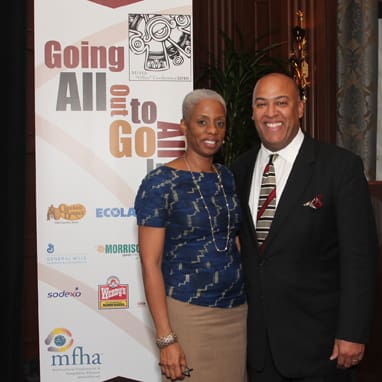When it comes to building a pipeline of talent with cultural intelligence, Gerry Fernandez, founder and president of the Multicultural Foodservice & Hospitality Alliance, urged attendees at the group’s annual conference that their organizations should be, “Going all out to go all in.”
 |
|
Gerry Fernandez |
A plethora of speakers offered diversity data that made for compelling dialogue and also encouraged participants to move beyond awareness by taking action.Speaking before a group of hotel and foodservice executives, Fernandez launched the event stressing that it’s not just about black and white, “It’s about green.” He said companies that ignore building a diverse workforce risk obsolescence and could go the way of “Sanka, TWA and Whiteout.”Fernandez, who opened the one-day conference at Chicago’s Allegro hotel, said despite the challenging economic conditions, “Building individual and company cultural intelligence is key.”
“I think that all of us who work in this space have to make sure that our most senior management understands what could happen if we don’t have a proactive diversity risk plan in place rather than scramble in the spur of the moment,” said panelist member Ken Levy, who is senior vice president of special projects at Johnson & Wales University.
Demographic trends in the United States show that by 2050 racial and ethnic minorities will account for 50% of the population and that the vast majority of new entrants into the workplace already are women, racial and ethnic minorities, and people with disabilities.
Presenters Betty Henderson Wingfield, an executive coach and business strategist, and Dr. Richard Bucher, a professor at Baltimore City College, told attendees how introducing “multicultural power dynamics” into an organization is used to build better teams. The duo also introduced statistics that showed Asians currently account for $913 billion in annual buying power while African Americans account for $500 billion, and Hispanics account for $950 billion.
 |
|
Dr. Robert Rodriguez |
Presenter Dr. Robert Rodriguez, who is the assistant dean of the graduate school of management at Kaplan University, told the audience that the primary difference between the term Latino and Hispanic is that Hispanic refers to United States residents that are descendants of Spain, Mexico or Spanish Caribbean descent and that Latino is any person of Latin American, Spanish or South American descent. He also said that the term Hispanic could be offensive to many because they believe it is a word that Anglos invented for them and that Latino is currently more acceptable.
When it comes to the terms, Black orAfrican American, most of the African Americans or Blacks, have a preference with 44% preferring the term African American and 42% preferring to be called Black, while 11% don’t care, said presenter Pepper Miller, who is the president of The Hunter-Miller Group. Miller made a strong case for marketers to understand the Black experience. She cited data that showed both White and Black shoppers cited “Price” as the number one criteria used for choosing a store but that their second criteria was vastly different. While White shoppers said “Carries brand I like,” was the second biggest factor the Black shoppers cited “Respect,” as their number two response.
 |
|
Pepper Miller and Gerry Fernandez |
Presenter Ron Kuramoto, a management consultant, led a session entitled, “Asians: The Myth of the ‘Model Minority.’” He identified the top stereotypes for Asians and how they derail corporate efforts to create talent pipeline connections. Some of those stereotypes center around the “model minority,” and include strong work ethics, family values and high educational achievements while the “bad Asian,” myths are good eyes, bad in math, good driver, bad grades in school, lazy, hates older people and talks loudly.
Fernandez said that diversity initiatives are in great peril. “The unfortunate truth is that corporations, large and small, have scaled back or entirely eliminated their diversity departments. The recession has made it easy for companies to cut back on their diversity commitment.”
MFHA, which was launched 15 years ago in Chicago, was formed to increase career opportunities for minorities. Its mission is to promote the business benefits of diversity and inclusion while helping its members attract, develop and retain multicultural talent.
Fernandez concluded where he began but encouraging attendees to engage. “Now is the time for our industry to go all in. We need to educate, advocate and connect.”

